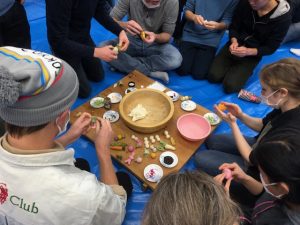Nudging away a confident rooster while spreading chicken feed that I mixed the week prior, I have never been closer to the process of food production. Shoveling silage into a barrel and mixing chicken feed not only harbored an appreciation for hard work, but also an understanding of how food can be produced. Living on the ARI farm makes you aware of the differences between your home life and the disciplined style of farm life. By making rice into charcoal and utilizing composted leaves, organic farming uses every available resource to sustainably produce food. Instead of using store bought fertilizers, pesticides, and GMOs, the ARI farm produces their own fertilizers and compost. By following the laws of nature and creating their own fertilizers, organic farming minimizes soil degradation and maximizes the quality of the grown food. While I was feeding the chickens the grain that I had helped mix earlier I realized the importance of the entire process of farming. Every step of the process is valuable and will affect the end product of the grown food. Though I found these chickens incredibly comical, I understand the importance of their role in organic farming. Following the theme of not wasting anything, even the eggshells are used to produce fertilizer.
From sharing chores, living spaces, and even slippers; the community seems to be what is most important to ARI. This community creates an environment that ARI believes can help individuals reach their fullest potential. Understanding each other and our relation to one another can help us understand our place in the world. Getting to experience a local area is incredibly important in understanding global problems as well. In Transnational Japan in The Global Environmental Movement, Avenall writes, “What interests me in such observations is the suggestion that the local is not— and never was— a nationally bounded space, and, more significantly, that within the local there exists a potential for universal vision, consciousness, and action transcending the local while remaining attached to it.” (page 53). Life at ARI constructs a philosophy that can be applied and tweaked to any type of life. I might not be able to incorporate the recipe for chicken feed into my daily life, but ARI’s philosophy will absolutely follow me beyond Japan. In The One-Straw Revolution, Masanobu Fukuoka emphasizes his philosophy of farming. Fukuoka preaches a philosophy of support and nature. When you create the necessary conditions for growing food, the laws of nature will take over and crops can be grown. Not only for farming, you can apply this philosophy to your relationships, your work life, and how you consume food.
A philosophy of harmony and community was also evident in the town of Nagawa-machi. The cultural activities–from making a dish with deep roots in the community and to witnessing the work of a papermaker– harbored a state of mind that emphasized a conservation of culture and a relationship with food. These cultural activities helped us St. Olaf students understand another local area where the inhabitants live a life that exemplifies a sustainable approach to living. Though there were not any explicit sustainable practices, besides the paper making, the culture of Nagawa-machi has the same cornerstones of a sustainable lifestyle. A conservation of culture, a close community, a close relationship with food, and the veneration of the natural world: the philosophy of Nagawa-machi is very much sustainably-focused.
In this photo ST. Olaf students are preparing a treat called mayudama with fellow Nodai students!
Getting to explore the local of Japan is a treat for us students. Though we cannot completely replicate the living conditions of the places we’ve been to, we can learn a great deal regarding our approach to life. We have learned different ways of community and what people can do when brought together. Our relationship with our food and our land will forever be changed. Through interacting with a diverse community, we understand that sustainability and community transcends culture and learning from one another is an incredible virtue. The value of the local is not only about a sense of place, but is also about how do we want to live our own life in a rapidly changing world?
Recent Comments